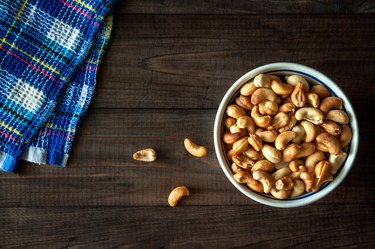
Although it's commonly associated with younger demographics, acne can be a problem for people of all ages. And while acne can be caused by a variety of factors (and often not one single source), your diet may contribute to your skin health.
Cashews are a nutritious snack that can be a part of a skin-healthy diet. While these nuts won't necessarily cure acne or skin conditions, replacing some of the more problematic elements of your diet may help improve your skin.
Video of the Day
Video of the Day
Acne-Fighting Nutrients in Cashews
Cashews are rich in antioxidants like vitamin E, which can not only help lower inflammation but also may help protect the body (and skin) against free radicals from air pollution or cigarette smoke and ultraviolet radiation from the sun, according to the National Institutes of Health (NIH).
Tip
A 1-ounce serving of raw cashews contains 0.26 mg of vitamin E — a little less than 2% of the recommended daily allowance (RDA).
Cashews are also high in zinc, providing about 11 percent of your daily recommended value per one-ounce serving, according to the NIH. Like vitamin E, zinc is known for its anti-inflammatory effects, according to a January 2017 article in Inflammopharmacology. This nutrient has been shown to benefit patients with acne, Joshua Zeichner, MD and the director of Cosmetic and Clinical Research Dermatology at Mount Sinai Hospital in New York, tells LIVESTRONG.com.
Nuts are also high in healthy unsaturated fats, according to Harvard Health Publishing. Unsaturated fats are not only good for your heart health but may even have some skin-related benefits.
Choosing the Healthiest Cashews
From flavored to roasted to salted, it can be helpful to know which types of cashews to eat in confidence and which to avoid. The healthiest form of cashews (and any nut, for that matter) is raw, according to Sarah Pflugradt, RD. However, if you're not a fan of raw nuts, lightly salted is another healthy alternative, given you do not have any blood pressure concerns.
On the other hand, honey-coated or flavored versions aren't as healthy, says Pflugradt. Typically, these are high in sugar, which is linked to promoting inflammation in the body. Although these snacks may be tastier, they're better avoided.
Are There Foods That Cause Acne?
Acne can be caused by a variety of factors, including your hormones, stress, certain medications and the foods you eat, according to the Mayo Clinic. While everyone has different reactions to different foods, swapping some common acne-causing foods for more healthy options (like cashews) is linked to helping improve your skin.
Typically, foods high in dairy (specifically cow's milk) or sugar, have been known to cause acne or breakouts, according to Dr. Zeichner. "It's unclear whether acne is triggered by hormones in the milk from the lactating cow or a high amount of sugar relative to fat in skim milk."
Another thing to take note of: The glycemic index is a scale that measures the affect that certain foods have on blood sugar levels — and typically, foods with a high glycemic index (like processed cereals, cookies or crackers) have been associated with triggering acne due to their ability to raise inflammation, according to Harvard Health Publishing.
The Bottom Line
If you're a fan of cashews, you'll be happy to hear that nuts are not typically associated with acne, according to Dr. Zeichner. In fact, cashews are rich in antioxidants, like vitamin E, and nutrients that may help calm the inflammation that causes acne. While cashews won't help cure or alleviate your acne symptoms, replacing some of the more processed, higher glycemic foods in your diet with healthy snacks like cashews may help promote healthier skin.
Was this article helpful?
150 Characters Max
0/150
Thank you for sharing!
Thank you for your feedback!